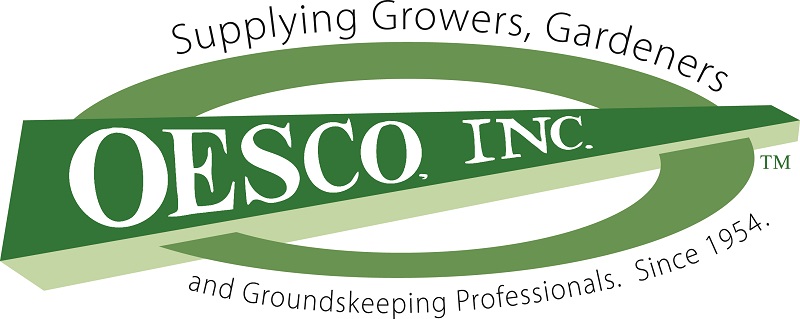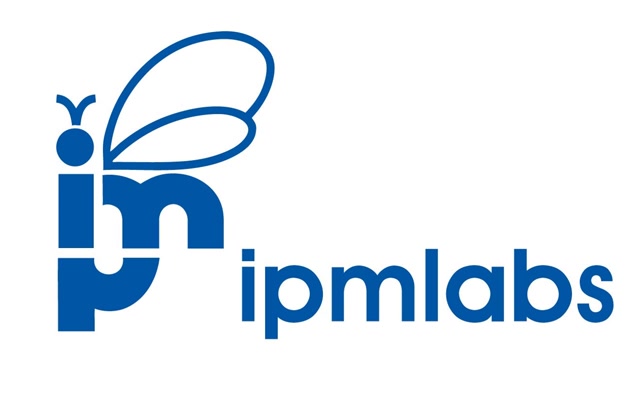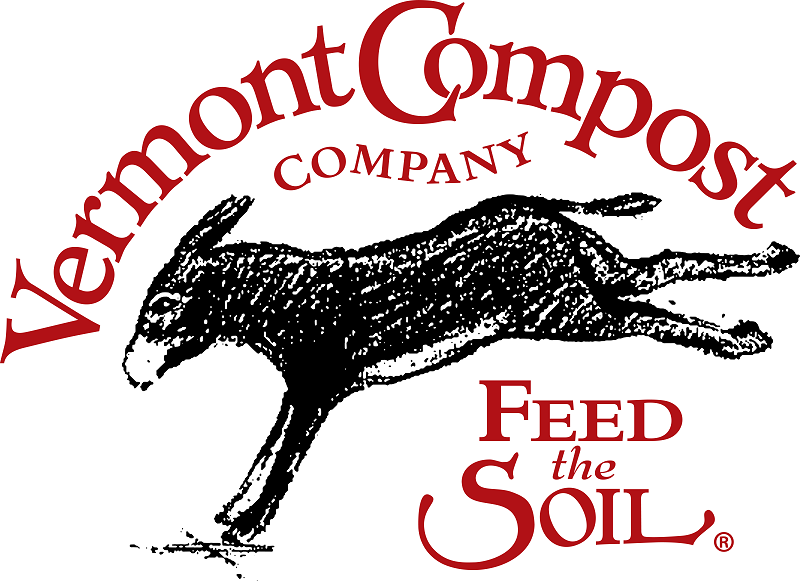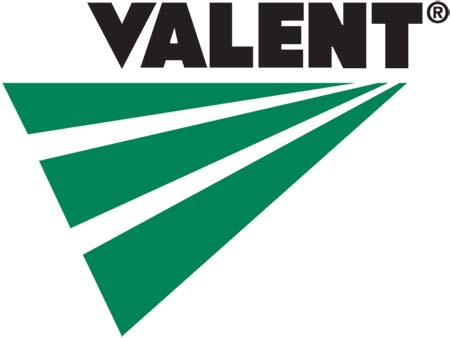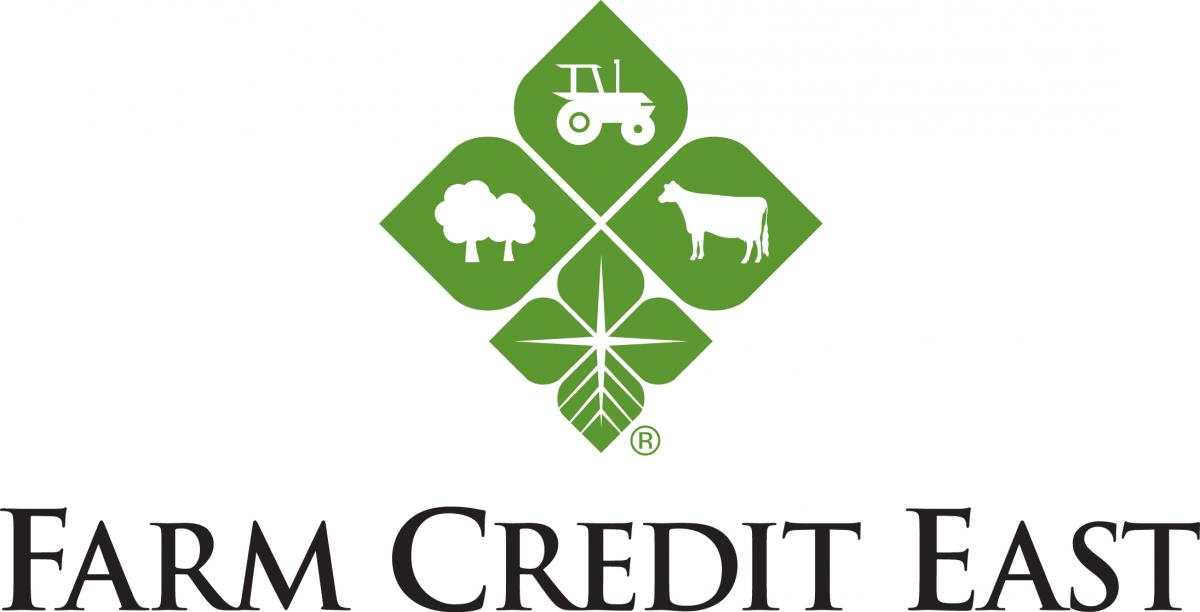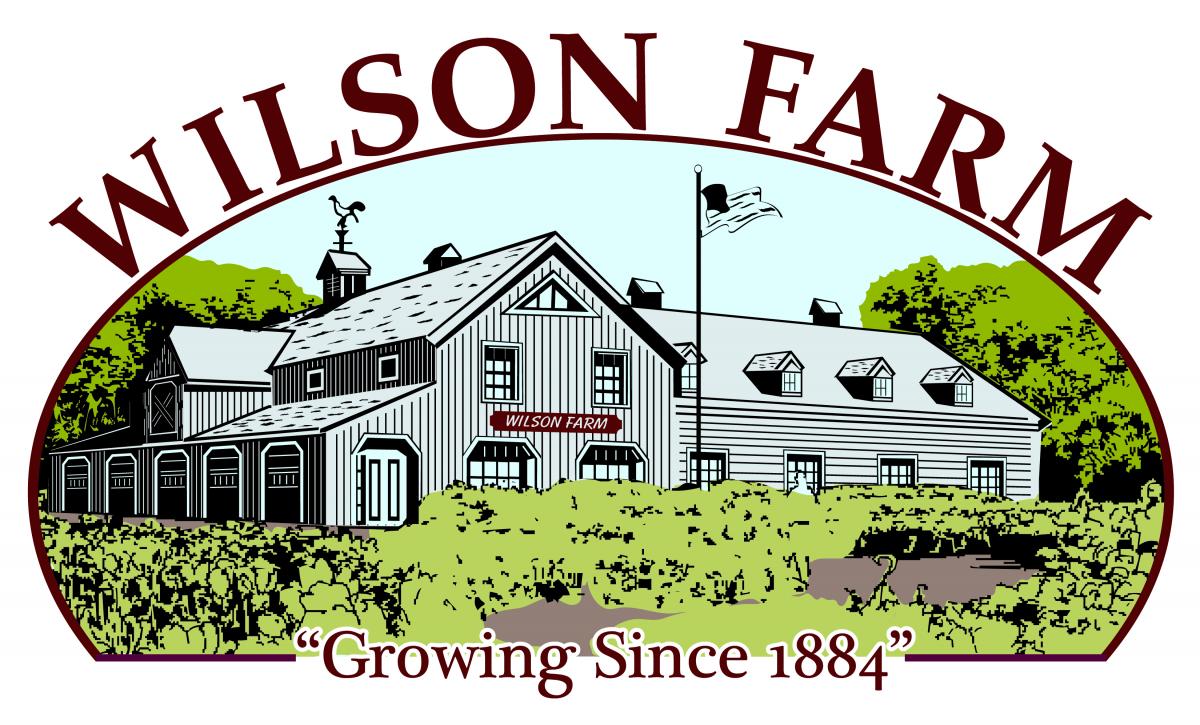Crop Conditions
Pest Alerts
Lettuce Rot Diseases in Winter High Tunnels
Timing Spring Vegetable Planting In a Changing Climate
New Grant at UMass Extension to Support Cut Flower Programming
News
Events
Sponsors

Crop Conditions
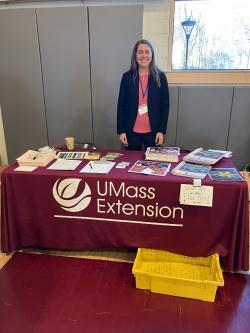 February is here, and the days are finally starting to get longer again. The big storm predicted for earlier this week made a sudden move south, leaving western Massachusetts with nothing but a few flakes while dumping several wet inches in the Southeast. Whatever the weather, winter work continues–harvesting high tunnel greens, distributing storage crops—and folks are busy putting final touches on spring plans including crop planning and placing seed orders.
February is here, and the days are finally starting to get longer again. The big storm predicted for earlier this week made a sudden move south, leaving western Massachusetts with nothing but a few flakes while dumping several wet inches in the Southeast. Whatever the weather, winter work continues–harvesting high tunnel greens, distributing storage crops—and folks are busy putting final touches on spring plans including crop planning and placing seed orders.
We’re in workshop and presentation mode at Extension, and we have a full calendar of events for the next few months. Yesterday was the first in our Fundamentals of Organic Production workshop series, and we had a great crash course in fertility management from Sam Glaze-Corcoran, the manager of the UMass Soil Testing Lab. Based on your feedback, we moved most of the events in the series to an online-only webinar format. If you missed yesterday’s webinar, click here to view the recording! Hope to see lots of you in 2 weeks on February 28 for the next webinar on Cover Cropping—see the Events section of this issue for the full list of programs.
You can also join us (in person!) on Saturday at the 608th Meeting of the New England Vegetable & Berry Growers’ Association, in Shirley, MA. Our new weed specialist Maria Gannett will present on soil-based weed management techniques in small fruit, and Genevieve Higgins will present on hot water seed treatment for controlling seed-borne pathogens and will give a live demo of the process.
For those needing (or wanting!) food safety training, we have 2 Produce Safety Alliance Grower Trainings scheduled for next month—March 13 in Milford and March 15 in Greenfield.
And finally, the recordings of last months’ crop insurance webinars are now available! If you’re curious about crop insurance, the sign-up deadline is coming up on March 15, so check out these Crop Insurance 101 and Crop Insurance 301 webinars to learn how it works.
We’re excited to announce a new Urban Agriculture Mentor Farm Program! This is an opportunity for urban farms to tackle their most challenging issues with UMass Extension’s new Urban Agriculture Educators. Mentor Farms will receive a $2,000 stipend and $500 in soil testing and/or plant diagnostic services and will be supported in becoming a resource for employees, service providers, and the broader urban farming community. The Mentor Farm application is open now through Thursday, February 29, and we encourage you to apply! See the News section for more details.
Learn more at ag.umass.edu/services/hot-water-seed-treatment
Pest Alerts
Winter Greens
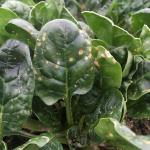 Cladosporium leaf spot is continuing to develop in high tunnel spinach, rendering entire tunnels unmarketable in some cases. This fungal disease causes small tan spots on the leaves, the centers of which eventually develop olive-green sporulation. The pathogen can be carried on seed and once it is established in a crop, the spores can spread via wind. The pathogen thrives in cool weather and high humidity. Till under infected crop residue promptly to encourage breakdown. The pathogen can be eliminated from seed using hot water or bleach (1.2% NaOCl for 10 minutes), although doing this at a large scale with lots of seed is tricky. See our Cladosporium Leaf Spot fact sheet for more information on bleach treatment. For instructions on hot water seed treatment, see our hot water seed treatment fact sheet, or join us on Saturday to see a live demo at the 608th Meeting of the New England Vegetable & Berry Growers’ Association! We can also hot water treat your seeds for you, although we are unable to treat large amounts of seed – click here for more info. There is reported to be variation in cultivar susceptibility, but seed producers do not report cultivar resistance. We currently have a Cladosporium resistance trial going on in our research high tunnel, so stay tuned for results this spring.
Cladosporium leaf spot is continuing to develop in high tunnel spinach, rendering entire tunnels unmarketable in some cases. This fungal disease causes small tan spots on the leaves, the centers of which eventually develop olive-green sporulation. The pathogen can be carried on seed and once it is established in a crop, the spores can spread via wind. The pathogen thrives in cool weather and high humidity. Till under infected crop residue promptly to encourage breakdown. The pathogen can be eliminated from seed using hot water or bleach (1.2% NaOCl for 10 minutes), although doing this at a large scale with lots of seed is tricky. See our Cladosporium Leaf Spot fact sheet for more information on bleach treatment. For instructions on hot water seed treatment, see our hot water seed treatment fact sheet, or join us on Saturday to see a live demo at the 608th Meeting of the New England Vegetable & Berry Growers’ Association! We can also hot water treat your seeds for you, although we are unable to treat large amounts of seed – click here for more info. There is reported to be variation in cultivar susceptibility, but seed producers do not report cultivar resistance. We currently have a Cladosporium resistance trial going on in our research high tunnel, so stay tuned for results this spring.
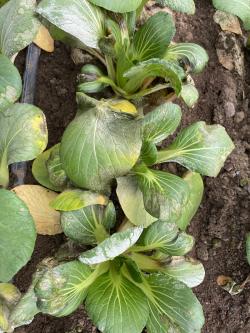
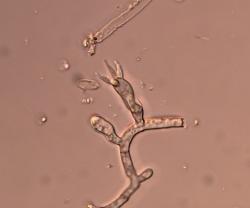 Rhizoctonia web blight was diagnosed on high tunnel Bok choy and Napa cabbage last month. Rhizoctonia solani is a fungus that is present in all soils and more commonly causes damping off in seedlings. In certain conditions, it can infect above-ground parts of plants, and causes water-soaked or necrotic spots and a characteristic white fungal mat on the surface of leaves and stems. [A fun plant pathology aside: Rhizoctonia is a basidiomycete – the same type of fungus as classic stem-and-cap mushrooms. All basidiomycetes produce spores on microscopic structures called ‘basidia’. The gills or pores beneath a mushroom’s cap are lined with basidia. Basidia have 4 tiny spines that each produce a single spore at the tip. When the spores are mature, they’re shot off the spines and are carried away by air currents. Rhizoctonia rarely produces basidia and spores, but this sample of web blight had beautiful examples – see the picture!]
Rhizoctonia web blight was diagnosed on high tunnel Bok choy and Napa cabbage last month. Rhizoctonia solani is a fungus that is present in all soils and more commonly causes damping off in seedlings. In certain conditions, it can infect above-ground parts of plants, and causes water-soaked or necrotic spots and a characteristic white fungal mat on the surface of leaves and stems. [A fun plant pathology aside: Rhizoctonia is a basidiomycete – the same type of fungus as classic stem-and-cap mushrooms. All basidiomycetes produce spores on microscopic structures called ‘basidia’. The gills or pores beneath a mushroom’s cap are lined with basidia. Basidia have 4 tiny spines that each produce a single spore at the tip. When the spores are mature, they’re shot off the spines and are carried away by air currents. Rhizoctonia rarely produces basidia and spores, but this sample of web blight had beautiful examples – see the picture!]
Botrytis crown rot was diagnosed in lettuce last month. This disease, which is fairly common in winter high tunnels, causes lower leaves of lettuce plants to melt away, and can progress into the crown of the plant. Infected leaves often develop characteristic fuzzy gray sporulation. See the article in this issue for more details on Botrytis and other lettuce rot diseases in winter tunnels.
Alternaria leaf spot was found in high tunnel claytonia, causing dark brown necrotic spots and smaller reddish leaf spots. There are many species of Alternaria that can cause disease on vegetable crops. Mycelium can survive 1-2 years in diseased crop residues and infect plants when conditions are humid and warm. Managing high tunnel humidity by venting and removing row cover on warm days can help avoid foliar diseases like this. Using drip irrigation instead of overhead, or overhead irrigating in the morning on sunny days to allow leaves to dry quickly can also help.
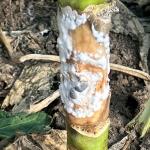 White mold was found this month in storage carrots and unincorporated brassica residues in a field. White mold has a wide host range and can infect most vegetable crops. It produces sclerotia – masses of fungal hyphae surrounded by a hard, black rind – that allow the fungus to persist in soils for 5-8 years. Infected plants develop a soft, watery rot, and develop lots of fuzzy, white mycelia. Sclerotia can be found within the mycelia. The fungus can move to new fields via infested soil and plant material, and also via wind-borne spores that are produced in infested fields in the spring. The wind-borne spores can only infected weak or senescent tissues. The biocontrol product Contans can be incorporated into infested soil in the fall to help control white mold. Contans is the fungus Coniothyrium minitans, which parasitizes white mold sclerotia.
White mold was found this month in storage carrots and unincorporated brassica residues in a field. White mold has a wide host range and can infect most vegetable crops. It produces sclerotia – masses of fungal hyphae surrounded by a hard, black rind – that allow the fungus to persist in soils for 5-8 years. Infected plants develop a soft, watery rot, and develop lots of fuzzy, white mycelia. Sclerotia can be found within the mycelia. The fungus can move to new fields via infested soil and plant material, and also via wind-borne spores that are produced in infested fields in the spring. The wind-borne spores can only infected weak or senescent tissues. The biocontrol product Contans can be incorporated into infested soil in the fall to help control white mold. Contans is the fungus Coniothyrium minitans, which parasitizes white mold sclerotia.
Lettuce Rot Diseases in Winter High Tunnels
In winter high tunnels, it’s fairly common to see lettuce crops rotting from the base upwards, and in some cases, fully melted heads. This can be caused by several different pathogens that are all favored by the cool, humid environment of a winter tunnel. Sometimes, more than one pathogen can be present at once, and they are unfortunately fairly difficult to control in a winter high tunnel environment.
Gray mold, caused by the fungus Botrytis cinerea, is a common pathogen in high tunnels year-round – it loves the high humidity in a tunnel. Botrytis produces lots of gray-brown asexual spores on the surfaces of infected tissue, giving them a fuzzy appearance. It is a weak pathogen; the spores cannot infect healthy, robust plant tissues initially but can infect weak or damaged tissues. In high tunnel tomatoes, Botrytis spores will infect senescent flowers or stems wounded from pruning, where the fungus is able to grow and gain strength before moving on to infect healthy fruit or stems. In winter lettuce crops, spores can infect senescent or damaged leaves (e.g. leaves that have been frosted or those cut during harvesting) and then move into the healthy stem and crown of the lettuce plants, causing the whole plant to melt. The leaves need to be wet for the fungus to infect. The fungus survives between plantings on crop residues and as sclerotia (small, hard, black masses of mycelia that serve as overwintering structures) in the soil. Botrytis often occurs along with other diseases, including bottom rot, moving in as a secondary pathogen.
Bottom rot is a similar disease to gray mold, but caused by a different fungus, Rhizoctonia solani. This is the same fungus that can cause damping off in seedlings, wirestem in brassicas, and other seedling diseases. Similarly to Botrytis, it is not a super strong pathogen but can take off when plants are somehow weakened, like in the cold, dark winter when lettuce crops are growing slowly. Rhizoctonia survives in the soil, as mycelium or sclerotia, and infects lettuce leaves that are in contact with the ground. Unlike Botrytis, it does not produce spores on the surface of the infected tissue. Bottom rot is most commonly seen affecting older lettuce plants.
Lettuce drop or white mold also looks similar to gray mold and bottom rot. The fungus that causes lettuce drop, Sclerotinia sclerotiorum, is a more aggressive pathogen than Botrytis or Rhizoctonia, and can infect healthy crops. Its host range includes many vegetables such as tomato and beans. It produces sclerotia that can survive in the soil for many years. Sclerotinia produces notable fluffy white mycelium on infected tissues, and pea-sized (or larger) sclerotia within the plant tissue. For management recommendations for lettuce drop, see our white mold fact sheet.
Management
- Till under summer crop residue thoroughly. All of these fungi can survive in crop residues and have broad host ranges. Sclerotia of Rhizoctonia survive for less time and are less able to infect plants at greater depths.
- Plant into raised beds with good drainage. All of these diseases are favored by wet conditions.
- Plant healthy, vigorous but not overgrown transplants.
- Take measures to reduce leaf wetness. Ventilate your high tunnels when it’s warm enough to do so, avoid using row cover unless it’s needed to prevent frost damage, use drip instead of overhead irrigation, control weeds.
- Few fungicides are labeled for Rhizoctonia or Botrytis and there is little efficacy data on their performance against those diseases. For a list of labeled products, see the lettuce disease section of the New England Vegetable Management Guide.
--Written by G. Higgins, UMass Vegetable Program
Timing Spring Vegetable Planting In a Changing Climate
--Written by Emmalea Ernest, Scientist, Delaware Extension Vegetable & Fruit Program. Originally published March 4, 2022, in Delaware Weekly Crop Update 30:1. Adapted for Massachusetts by G. Higgins, UMass Extension Vegetable Program.
Success with spring planted vegetables depends on getting seeds or transplants into the field at the right time. Timing plantings correctly is getting trickier since the average growing season length for Massachusetts has increased by 11 days since 1895 (and the range of increases for New England states ranging from 11 to 27 days), with most of the increase occurring since 1990. On average, the last spring frost is occurring 3.5 days earlier and the first fall frost is occurring 7 days later, in MA. Throughout New England, the last spring frost is occurring 2-13 days earlier and the first fall frost is occurring 7-13 days later. However, the spring weather conditions in any given year are unpredictable, which can make the season stressful or downright discouraging. Plantings can be damaged by cold weather, or on the other end of the spectrum, unseasonable hot weather can stress cool season crops. Here are some tips to increase your chance for success with spring planted vegetables in a changing climate.
Know Likely Frost/Freeze Free Dates for Your Site
Frost can begin to form when air temperatures drop close to 32°F. A freeze occurs when temperatures reach 32°F or lower and a hard freeze occurs with sustained temperatures of 28°F or lower. Some crops will tolerate a frost or freeze, some will tolerate a hard freeze and some will not tolerate either. The likelihood of frost or freeze after a certain date can be estimated based on past years’ temperatures.
You should also consider conditions that are specific to your location. Urban sites retain more heat creating a microclimate, termed a “heat island”, with a longer frost-free period. Areas near large bodies of water or with topography that allows cold air to settle into lower elevation areas will be protected from freezes when temperatures near 32°F. Conversely, low areas where cold air collects or flat areas where cold air cannot drain will be more at risk of late spring freezes. Knowing how your site deviates from the average for your area will help you decide if you can plant cold sensitive crops earlier in the season or if you should be more cautious. Even though the average growing season length has increased in Massachusetts the degree of increase may vary by location in the state.
Use Historically Recommended Planting Dates as a Guide
Planting dates are often recommended by seed companies, and growers often have their own set of historic planting dates to start from. These planting dates are based not only on a crop’s tolerance of cold weather but also on their time to maturity and desired harvest window. For example, Brussels sprouts are cold tolerant, but they are transplanted in June for fall harvest because they require a long growing season. To adapt to warmer spring conditions and a longer growing season, choose dates earlier in the planting window for cool season crops, especially those that are prone to quality problems when exposed to heat (e.g., lettuce, cauliflower, broccoli). In many years, warm season crops can be planted early in their recommended window to achieve earlier harvest.
Variety Selection
For cool season crops that might be impacted by unseasonably hot conditions in April, May and June, choose varieties with heat tolerance. Heat tolerant lettuce varieties will be less prone to bolting and turning bitter tasting. Heat tolerant broccoli and cauliflower are less prone to quality-reducing physiological disorders. Another strategy to avoid damage from heat stress is to plant several varieties with different days to maturity. Planting several varieties makes it less likely that all the plants will be at the heat susceptible growth state during a period of hot weather. A similar approach is to make sequential plantings of the same variety during the entire planting window.
Use Season Extension Aids for Very Early Plantings
Many growers use added inputs to modify the environment for seedings and increase the chance of success with early season plantings. This includes plastic mulch, floating row covers, low tunnels, and rye windbreaks. See the past WCU article by Gordon Johnson “Transplanting Warm Season Crops in April” for a detailed discussion of these practices.
Check the Forecast Before Planting
Before deciding on an early planting date, check the weather forecast to determine if predicted conditions will support plant growth. This is especially important if you are planting cold sensitive crops early. If you are in a freeze prone site, note any predicted clear nights which could result in frost even if temperatures are not forecast to drop to 32°F. Try to plant at a time when temperatures are expected to be warm for a few days afterward. When direct seeding, warm temperatures promote faster germination resulting in less exposure to insects and diseases that impact seeds. Transplanting at the beginning of a warm period allows plants to quickly root into the soil, improving their stress tolerance. Also avoid transplanting right before forecasted strong winds which can quickly dry out transplants that have not yet rooted into the soil.
Acclimate Transplants
Make sure that transplants have the best chance of survival by acclimating them to higher light and lower humidity conditions before planting. Transplants should be moved from the greenhouse to an outdoor location in partial sun and protected from excessive wind. Maintain transplants in these conditions for a week before planting to the field. Move or cover transplants if very cold or windy conditions are expected.
Be Ready to Frost Protect
Even though some recent spring seasons have been warm we have still had years with very late frosts (such as in 2020) so be prepared to protect sensitive plants if freezing conditions are predicted. Some crops such as potatoes and sweet corn will regrow if the plants are still small when frost damaged. Other crops such as tomatoes, peppers and melons, will not regrow if plants are frozen. Row covers can be used to protect frost sensitive vegetables that have already been planted in the field. Covers should be applied in late afternoon before air temperatures fall to retain heat accumulated in the soil.
New Grant at UMass Extension to Support Cut Flower Programming
In recent years, consumer interest in local cut flowers has boomed. The pandemic shuttered traditional florists and disrupted global flower supply chains, forcing consumers to buy local and creating new flower-buying habits. Social media has also changed consumer’s floral expectations, spurring excitement around unusual or whimsical wildflowers that can only be sourced locally.
More and more farmers are growing flowers to meet the demand. National membership in the Association of Specialty Cut Flower Growers increased nearly 3-fold from 1996 to 2018, and then nearly doubled again from 2018 to 2022. In 2020 and 2021 alone, official membership in the Slow Flowers network rose by more than a third. Anecdotally, we’ve seen a surge in small-scale cut flower production here in Massachusetts – both vegetable farmers growing flowers on the side, and new cut flower farms popping up.
However, there are very few resources for cut flower growers in Massachusetts and New England. Here at UMass, our Greenhouse, Floriculture and Vegetable Extension teams have been getting more cut flower questions. In response to this growing demand, we decided to survey cut flower growers to learn more about their needs. We distributed the survey in December 2021 and January 2022, and found that no single challenge stood out; instead, cut flower growers wanted help on a range of topics, including pests, diseases, soil health, marketing, finances and crop planning (you can read the results here).
We’re happy to announce that we’ve received a grant to provide education on a variety of cut flower topics . Specifically, this two-year grant will fund winter webinars, summer on-farm workshops, and new handouts on cut flower topics.
And our first two webinars are on the calendar! As we head into spring, join us for two virtual cut flower talks:
-
Friday March 1, 2:30-3:30pm – Cut Flower Pest Management Using IPM: Elizabeth Lamb from Cornell University will talk about IPM techniques for cut flower production.
-
Click here to register.
-
Friday March 8, 2:30-3:30pm – Preproduction Planning for Cut Flowers: Jonathan Ebba from UNH will talk about scheduling, costs, and pricing for cut flower growers.
-
Click here to register.
Both workshops are free, though we ask that you register in advance.
We are excited to increase our support for cut-flower growers around the state. We also want to hear from you! If you are a cut flower grower, and want to chat with us about your operation and the resources you’d like to see from extension, email Hannah Whitehead (hwhitehead@umass.edu) or umassveg@umass.edu.
--Written by H. Whitehead, UMass Vegetable Program
News
Announcing the New UMass Extension Urban Agriculture Program
UMass Extension is pleased to announce two new Extension Urban Agriculture Educators and a new Urban Agriculture Mentor Farm Program (see application info below). We are excited to support the state’s growing urban farming community!
Our Urban Agriculture Extension Educators
Ibrahim Ali joined the team this past October and is based at the Amherst Campus. Olivia Golden joined us in December and is based at the Mt. Ida Campus in Newton. Their roles are to support community-based agricultural projects in urban areas of MA. Welcome to the team, Ibrahim and Olivia!
Urban Agriculture Mentor Farm Program
This program is designed to support urban farmers and foster sustainable agricultural practices on urban farms in MA. Ibrahim and Olivia will work closely with three different urban farmers/projects each year, providing engagement with Extension staff and helping them tackle their most challenging issues.
Mentor Farms also receive a $2,000 stipend and $500 in soil testing and/or plant diagnostic services. By taking part in the program, urban farms will not only receive personalized on-farm training and consultation, but we will assist you to be a mentor to other urban ag projects and farms, sharing newfound knowledge and experiences with employees, service providers, and the broader urban farming community.
Click here to apply! Application deadline Thursday, February 29, 11:59pm.
This work is supported by the National Institute of Food and Agriculture, U.S. Department of Agriculture, through the Northeast SARE program under subaward number SNE23-004-MA-AWD00001024.
MDAR Now Accepting Resilient Food Systems Infrastructure (RFSI) Grant Applications
The RFSI will fund projects that expand capacity, aggregation, processing, manufacturing, storing, transporting, wholesaling, and distribution of locally and regionally produced food products, including specialty crops, dairy, grains for human consumption, aquaculture, and other food products, excluding meat and poultry.
MDAR plans to award grants to support infrastructure in the middle-of-the-supply-chain for domestic food and farm businesses and other eligible entities.
MDAR will accept one of two types of proposals from applicants for this grant funding:
Infrastructure Grants - large-scale grants up to $500,000 that will enhance resilience in the middle-of-the-supply-chain and strengthen local and regional food systems by creating new revenue streams for producers, and
Simplified Equipment-Only Grants - equipment-only fixed-price grants between $10,000 and $100,000.
To download the RFR and for more information, please visit the RFSI Webpage.
The deadline to submit an application is Friday, March 29, 2024 by 4:00pm.
There will be an informational webinar held on Tuesday, March 5, 2024 at 12:00pm. Click here to register.
Events
608th Meeting of the New England Vegetable & Berry Growers’ Association
When: Saturday, February 17, 2024, 9am-3:15pm
Where: Bull Run Restaurant, 215 Great Rd., Shirley, MA 01464
Registration: $20. Lunch buffet is an additional $25. (pay at the door). Please RSVP to Chris Grant at 978-423-6694 or secretary@nevbga.org.
Talks will include:
-
Potential soil-based weed management techniques in small fruit - Maria Gannett, UMass Extension
-
Endangered species program & FIFRA - Andrea Szylvian and Kelly Tindall, EPA
-
Hot water seed treatment - Genevieve Higgins, UMass Extension Vegetable Program
-
Spotted lanternfly: Biology, identification, and impacts - Elizabeth Barnes, MDAR
-
Strawberry grower panel
-
Cucurbit update - Chris Hernandez, UNH
4 pesticide recertification credits are available for this meeting.
Upcoming Tree Fruit Mass Aggie Seminars for Home Orchardists
When: Saturdays, February 17 - March 9, 2024, 10:30am - noon
Where: Online or in-person, depending on the workshop
Registration: $35 per person, except for Feb 24 which is $60 per person. Click here to register.
-
February 17: Orchard Establishment
-
February 24: For the Love of Pollinators
-
March 2: Integrated Pest Management & Insect ID
-
March 9: Orchard Pruning
2024 Eastern NY Fruit & Vegetable Conference
When: Wednesday and Thursday, February 21 and 22, 2024
Where: The Desmond Conference Center, 660 Albany Shaker Rd., Albany, NY 12211
Registration: See event page for registration and walk-in rates.
Join Cornell Cooperative Extension for 2 full days of informative sessions, many of which will offer pesticide recertification credits. The programming will include tree fruit, small fruit, vegetable, cut flower, and agritourism sessions. Click here for the full program.
Farm Succession Workshop
When: Tuesday, February 27, 2024, 8:45am
Where: Locust Grove Estate, 2683 South Rd., Poughkeepsie, NY 12601
Registration: Free! Coffee and lunch provided. Participants must register in advance. Click here to register. Hotel rooms are available at a group rate at Holiday Inn, 2750 South Rd., Poughkeepsie. Click here to reserve a room, and use booking code EGM.
Land For Good and Red Tomato are hosting a Farm Succession Workshop this month. Farms are encouraged to send 2 people per farm, because it makes for better follow-up and post-workshop conversation and planning.
This workshop is made possible by a grant from Northeast SARE.
NEVBGA/MFGA Meeting - Labor Issues
When: Wednesday, February 28, 2024 at 9:00am
Where: Hollis Hill Farm, 340 Marshall Road, Fitchburg, MA, 01420
Registration: $20 (waived for NEVBHA and MFGA members); lunch is an additional $20 for all. To register, please RSVP to Chris Grant at 978-423-6694 or secretary@nevbga.org by February 25.
The New England Vegetable and Berry Growers’ Association, in conjunction with the Massachusetts Fruit Growers Association present an all-day meeting.
Agenda
9:00 – Registration
9:30-10:30 – 10 Tips for Dealing with Difficult Customers in 45-Minutes – John Henderson, Director, Learning and Development at the Employers Association of the NorthEast (EANE)
10:45-11:45 – Employee Handbook: Do I need one? How do I make one and use it effectively? – Legal Food Hub
Noon – LUNCH & Commercial Member introductions, extension updates, NEVBGA updates
1:00-2:00 – Hiring and firing do’s and don’ts for agricultural businesses – Legal Food Hub
2:15-3:15 – H2A Update and Listening Session at 3:15
Adjourn
Commercial members are welcome to put up table-top displays. Please contact Secretary-Treasurer Chris Grant in advance at 978-423-6694 or nevbga@gmail.com.
Fundamentals of Organic Production Workshop Series
When: Several dates, 10:00am – 11:30am, or as noted below
Where: online via Zoom, or in-person as noted below
Registration: Free! See each event page, below, to register.
Are you looking to increase or improve your organic growing methods? Join UMass Extension and NOFA/Mass for a series on fundamentals of organic vegetable and small fruit production. This series is part of the USDA Transition to Organic Partnership Program (TOPP). To learn more about the UMass & NOFA/Mass programming, check out the NOFA/Mass TOPP web page. To learn more about the national TOPP program, visit www.organictransition.org.
These workshops are intended for commercial vegetable and small fruit growers. See the links below for information and registration for each workshop.
February 14: Fundamentals of Fertility – click here to watch the recording!
February 28: Cover Cropping
March 14: Organic Small Fruit Production
March 27: Organic Greenhouse Production – in person! This course 10am to 1pm, includes lunch
April 10: Organic Management of Vegetable Pests
April 24: Organics and Food Safety
This series also includes 2 in-person field walks this summer. Save these dates and stay tuned for more details and registration info!
June 25: Brookfield Farm, Amherst, MA
July 9: TBD
There will also be opportunities for one-on-one consultations with UMass Extension specialists in fall 2024. Visit the NOFA/Mass TOPP web page for more ways to get involved!
Kick Off Spring with Two Cut Flower Webinars
When: Friday, March 1 and Friday, March 8, 2:30-3:30pm
Where: Virtual
Registration: Free, but please register for each talk separately in advance
March 1 – Cut Flower Pest Management using IPM: Elizabeth Lamb from Cornell University will talk about IPM techniques for cut flower production. Register here
March 8 – Preproduction Planning for Cut Flowers: Jonathan Ebba from UNH will talk about scheduling, costing, and pricing for cut flower growers. Register here
The UMass Vegetable Extension team is hosting two webinars on cut flower production. First, Elizabeth Lamb from Cornell University will talk about IPM practices for managing pests in cut flower systems. Next, Jonathan Ebba will share scheduling, costing, and pricing tips for cut flower growers. They are stand-alone talks (not a series), so you are welcome to join us for one or both! Webinars are free, but registration is requested.
Questions? Contact Hannah Whitehead at hwhitehead@umass.edu.
UMass Produce Safety Alliance Grower Trainings
When: Wednesday, March 13 (Milford) or Friday, March 15 (Greenfield), 8:30am to 5:00pm
Where: See details below
Cost is $50 for each program and includes the required PSA Grower Manual ($60 value), a Certificate of Course attendance from AFDO ($35 value), and lunch and refreshments. See below for individual registration links.
Who Should Attend: Fruit and vegetable growers and others interested in learning about produce safety, the Food Safety Modernization Act (FSMA) Produce Safety Rule, Good Agricultural Practices (GAPs), and co-management of natural resources and food safety. This course will also cover the Massachusetts Commonwealth Quality Program (CQP), a voluntary 3rd-party audit program. This training satisfies the FSMA Produce Safety Rule requirement for covered farms that “at least one supervisor or responsible party” completes “food safety training … recognized as adequate” by FDA (21 C.F.R. §112.22(c)). For more information on the Produce Safety Alliance and the Grower Training Course, click here.
Milford
When: Wednesday, March 13, 2024 - 8:30am to 5:00pm
Where: DoubleTree by Hilton Hotel Boston – Milford, 11 Beaver St, Milford, MA, 01757
Registration: Click here to register
Greenfield
When: Friday, March 15, 2024 - 8:30am to 5:00pm
Where: Greenfield Community College, 1 College Drive, Community Room (C208), Greenfield, MA, 01301
Registration: Click here to register
This program is co-hosted by UMass Extension and the MDAR Produce Safety Program.
Questions? Contact Lisa McKeag, lmkeag@umass.edu, 413-658-8631
2024 Statewide NRCS & Conservation Districts Local Working Group
When: Tuesday, March 19, 9:30am-12:00pm
Where: Online
Registration: Click here to register.
This meeting is open to all MA growers. It is an opportunity to provide input to the Natural Resources Conservation Service (NRCS) and your local Conservation District on natural resource priorities and management strategies specific to your region. Your input will help both NRCS and the Districts shape their programming to better serve all regions of Massachusetts. Agricultural producers, owners/operators of nonindustrial private forest land, professionals representing agricultural and natural resource interests, and individuals representing a variety of disciplines in the soil, water, wetland, plant, forestry, and wildlife sciences are all welcome. See this factsheet for more information.
Also, if you have not already had an opportunity to fill out the county-level survey on local natural resource issues, which has been distributed by each Conservation District, please do – even if you cannot attend the Local Working Group meeting. You can find the survey here.
Questions? Contact Austin Miles, Farm Bill Outreach Coordinator, MA Association of Conservation Districts, at amilesmacd@gmail.com or (740) 818-8889.
FSPCA Preventive Controls for Human Food Certification Training
When: Tuesday, March 19, 2024 - 8:30am to Thursday, March 21, 2024 - 5:30pm
Where: UMass Amherst, 102 Holdsworth Way, Chenoweth Laboratory, UMass Food Science Building, Amherst, MA, 01003
Registration: $700. Click here to register.
This course is intended for food processors. The Current Good Manufacturing Practice, Hazard Analysis, and Risk-based Preventive Controls for Human Food FDA regulation is intended to ensure safe manufacturing/processing, packing and holding of food products for human consumption in the United States. The regulation requires that certain activities must be completed by a “preventive controls qualified individual” who has “successfully completed training in the development and application of risk-based preventive controls.” This course developed by the FSPCA is the “standardized curriculum” recognized by FDA; successfully completing this course is one way to meet the requirements for a “preventive controls qualified individual.” To complete the course, a participant must be present for the entire workshop and actively participate in all of the presented exercises.
UMass Extension Second Annual Soil Health Mini School – Only a few spots left!
When: March 21, 2024, 9:00 am - 3:30 pm
Where: Fernald Hall Room 107 at UMass Amherst, 270 Stockbridge Rd Amherst MA 01003
Registration: Free! Click here to register. Limited to 25 participants due to the hands-on components. If the course is full, you can join the wait list. We’ll let you know if a space opens up and also keep you updated about future soil-related events!
Join us for this free, full-day event! This workshop is designed to support agricultural service providers, agency professionals, and industry professionals conducting soil-health related work. Farmers, nonprofits, master gardeners, and community leaders are also welcome.

